Watch our Executive Director Chris Coulter at the Munich Security Conference!
Watch our Executive Director at #MSC2026!
Our Library
Explore our publications, from research papers and series to educational materials, covering all aspects of conflict transformation and peace promotion.
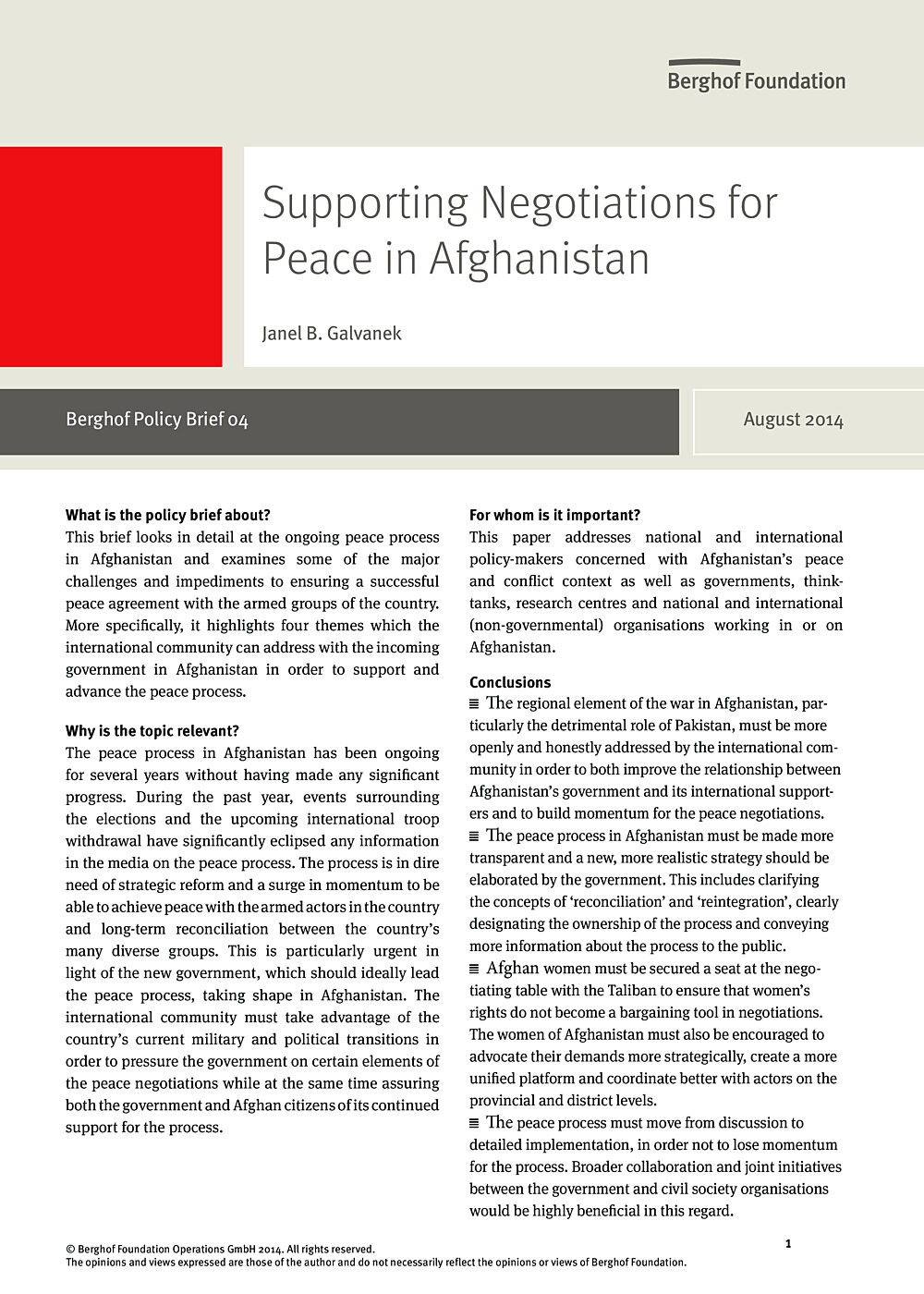
Supporting Negotiations for Peace in AfghanistanPolicy brief No. 4
- Year2014
- Author(s)Janel B. Galvanek
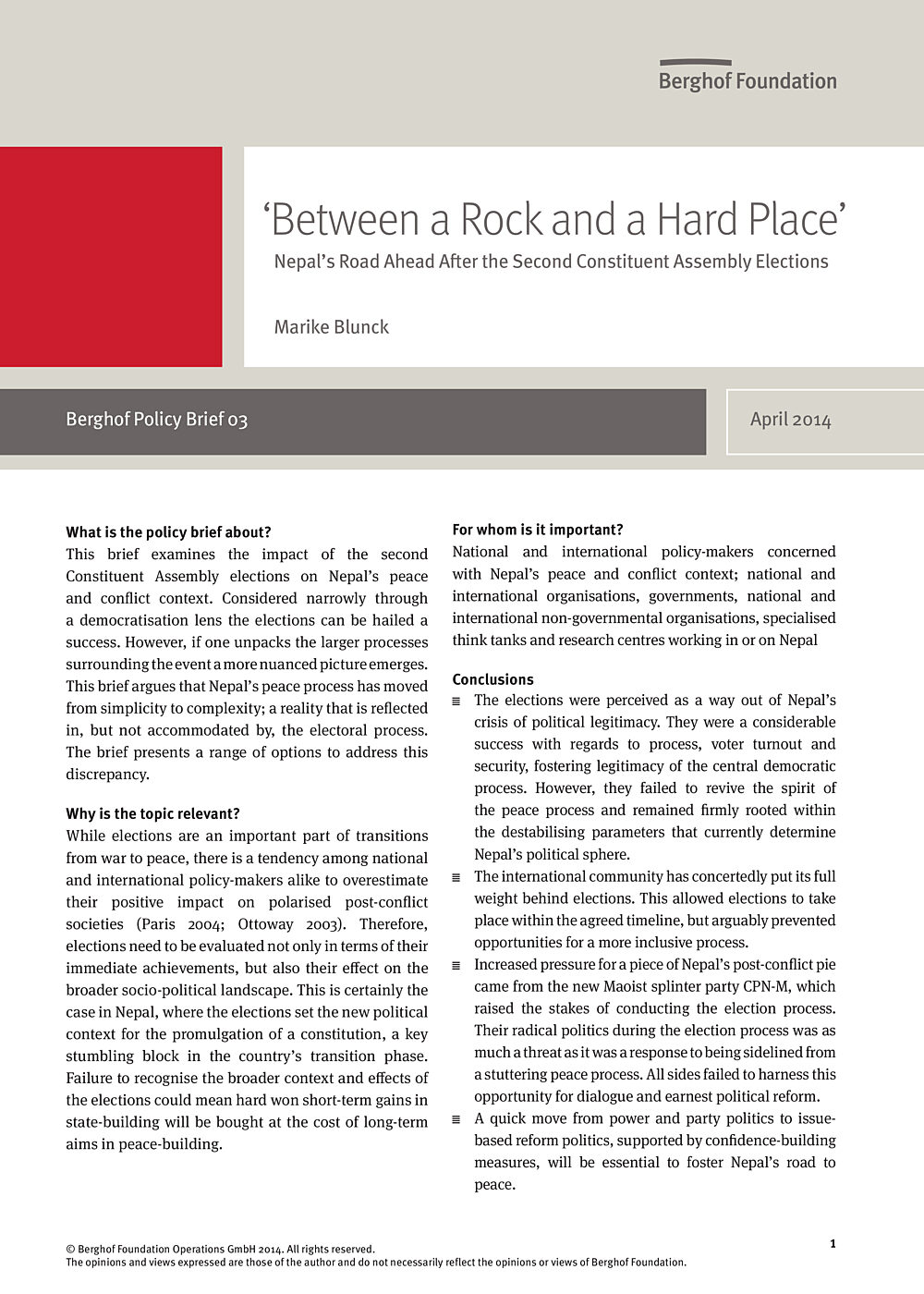
Between a Rock and a Hard Place: Nepal’s Road Ahead After the Second Constituent Assembly ElectionsPolicy brief No. 3
This brief examines the impact of the second Constituent Assembly elections on Nepal’s peace and conflict context. Considered narrowly through a democratisation lens the elections can be hailed a success. However, if one unpacks the larger processes surrounding the event a more nuanced picture emerges. This brief argues that Nepal’s peace process has moved from simplicity to complexity; a reality that is reflected in, but not accommodated by, the electoral process. The brief presents a range of options to address this discrepancy.
- Year2014
- Author(s)Marike Blunck
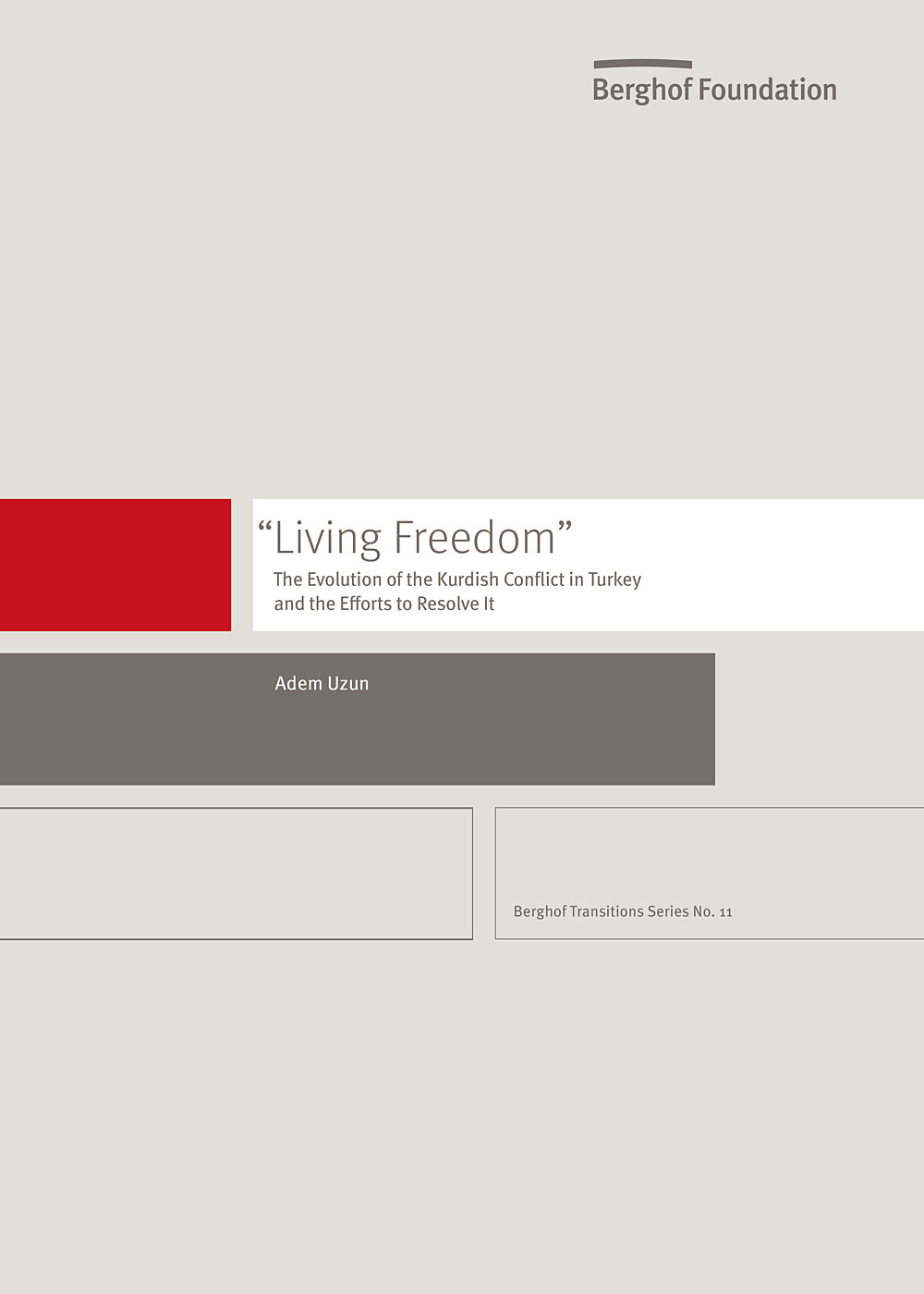
“Living Freedom” – The Evolution of the Kurdish Conflict in Turkey and the Efforts to Resolve ItTransitions Series No. 11
The unresolved ‘Kurdish question’ is closely tied to the interests of global powers, and as such is as much the problem of England, the United States (US) and the European Union (EU) as of Turkey, Iran, Iraq, Syria and the region. In short, the Kurdish question is an international problem.
Because Kurds have always lived under the sway of others, they have had difficulty establishing the internal dynamics and motivation required for self-administration. The result has been a lack of societal unity and religious ideologies that sometimes conflict with one another – which explains the Kurdish people’s vicious cycle of dividedness, external reliance, inner conflict and subdivision into even smaller pieces.
- Year2014
- Author(s)Adem Uzun
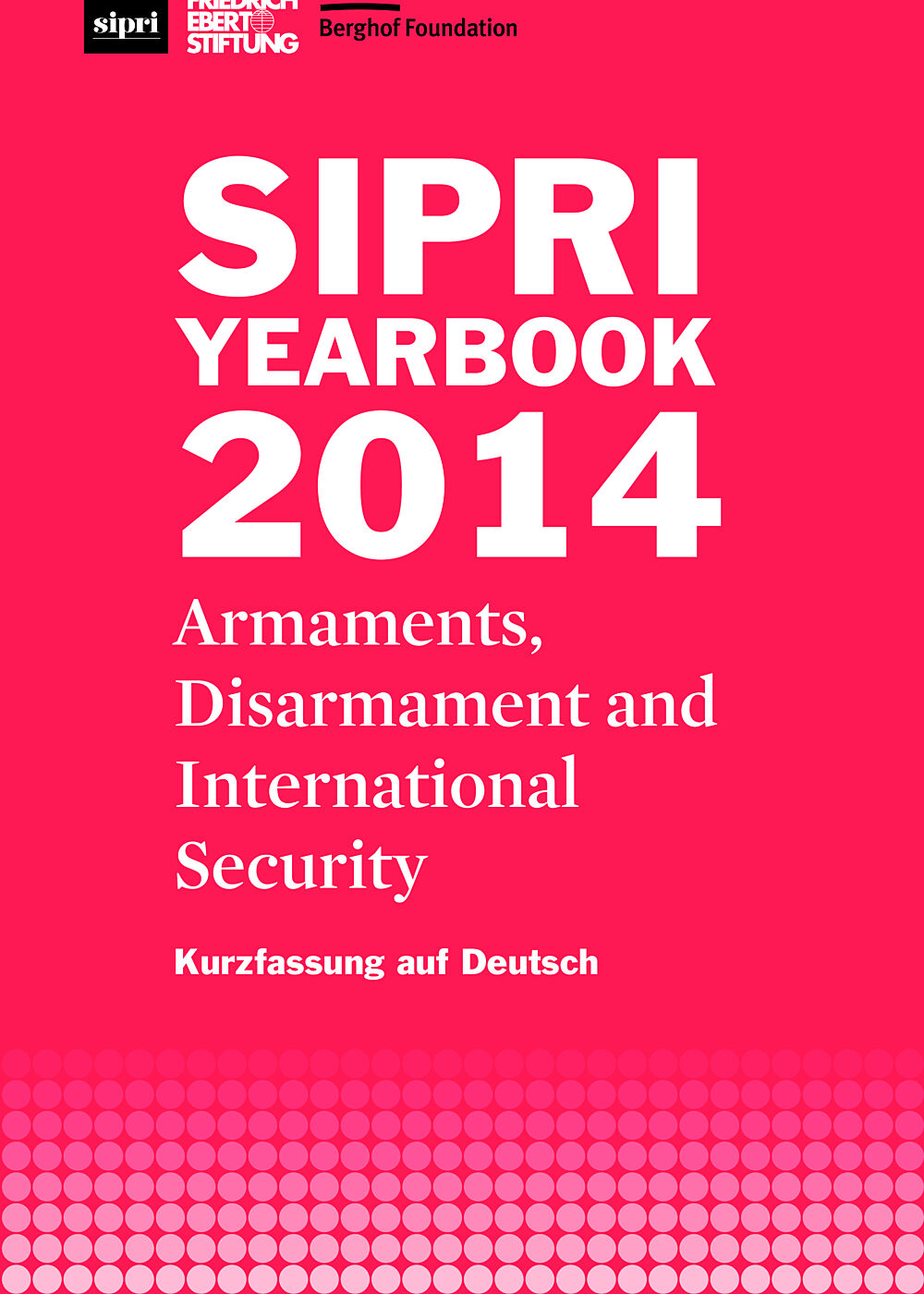
SIPRI Yearbook 2014Armaments, Disarmaments and International Security (Kurzfassung auf Deutsch)
Das SIPRI Yearbook 2014 ist eine Zusammenstellung von Originaldaten aus den Bereichen globale Militärausgaben, internationale Rüstungstransfers, Rüstungsproduktion, Atomstreitkräfte, bewaffnete Konflikte und multilaterale Friedenseinsätze sowie von neuesten Analysen wichtiger Aspekte der Rüstungskontrolle, des Friedens und der internationalen Sicherheit. Das SIPRI-Jahrbuch, das erstmals 1969 erschienen ist, wird von SIPRI-Forschern und eingeladenen externen Experten verfasst. Diese Broschüre fasst die Inhalte des SIPRI Yearbook 2014 zusammen und enthält eine Auswahl an Daten und Informationen aus dem Jahrbuch.
- Year2014
- Author(s)Stockholm International Peace Research Institute (SIPRI)
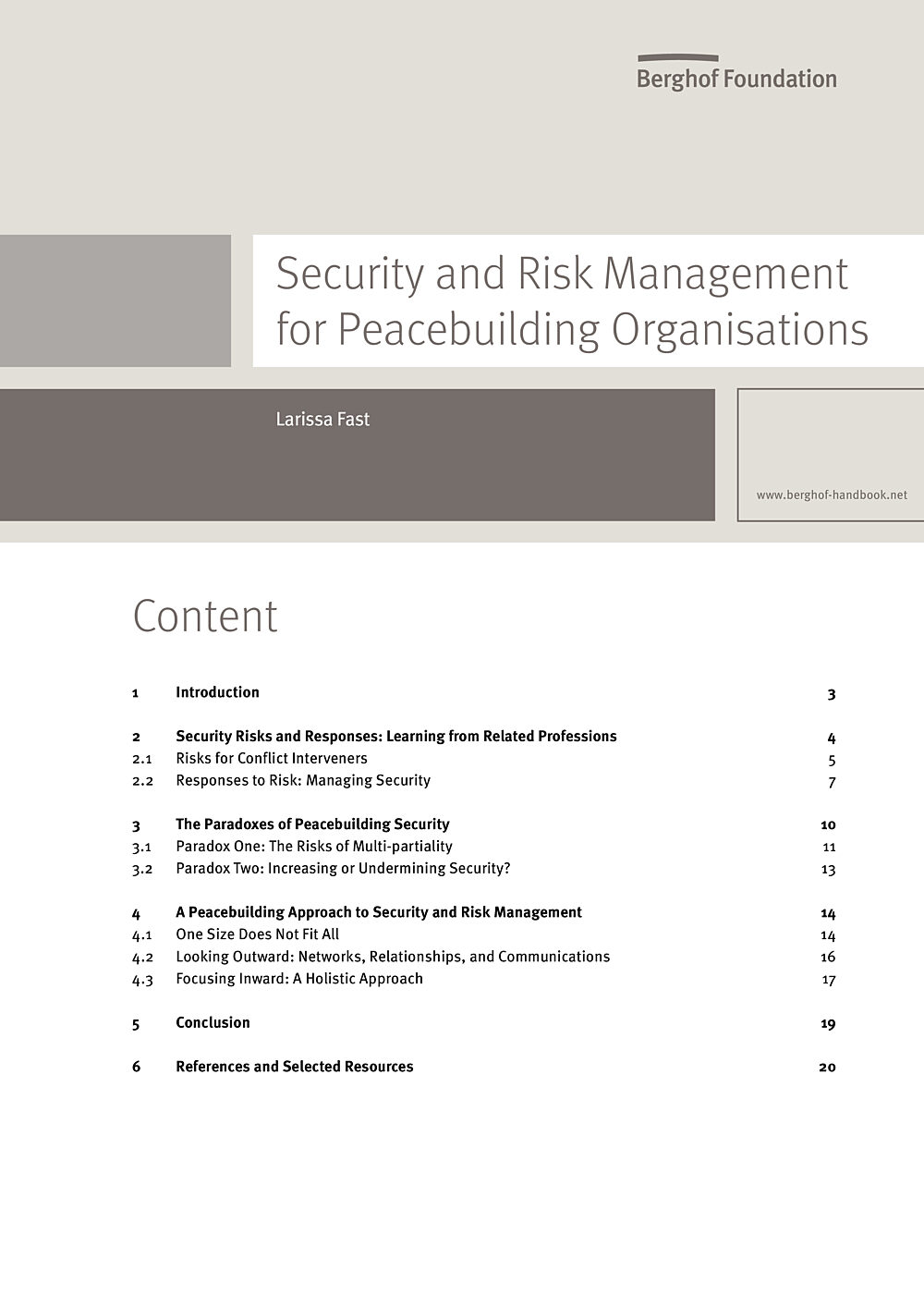
Security and Risk Management for Peacebuilding OrganisationsHandbook Article
Explores the particular shape of peacebuilding security, taking as a starting point the security risks and strategies of the related professions of humanitarian, development, and human rights work. The author presents two paradoxes of peacebuilding security, relating to multi-partiality and concerns about instrumentalising security. Building on these paradoxes, she outlines three cornerstones of a peacebuilding approach to security and risk management – adapting to context and organisational profile, emphasising relationship-building and communication, and taking a holistic approach.
- Year2014
- Author(s)Larissa Fast
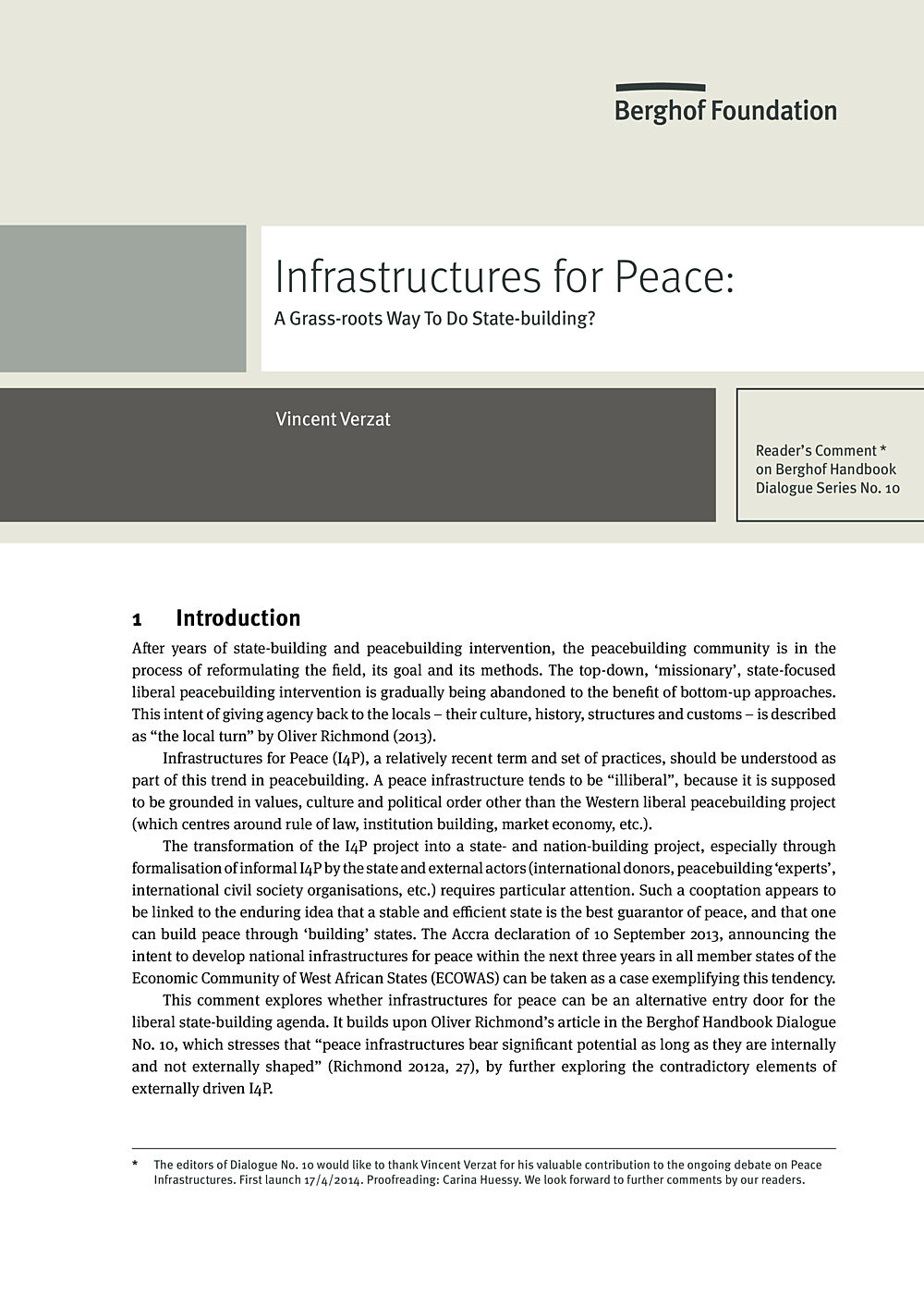
Infrastructures for Peace: A Grass-roots Way To Do State-Building?Berghof Handbook Dialogue Series No. 10
Can infrastructures for peace – inadvertently or by design – be used to further state-building fashioned after the liberal peacebuilding agenda? This is the question Vincent Verzat is exploring in his reader’s comment to Berghof Handbook Dialogue No. 10. His article Infrastructure for Peace: A Grass-roots Way To Do State-building? takes a close look at the discourse and rhetoric used by international organisations and questions one of I4P’s role-models, the Ghanaian peace architecture
- Year2014
- Author(s)Vincent Verzat
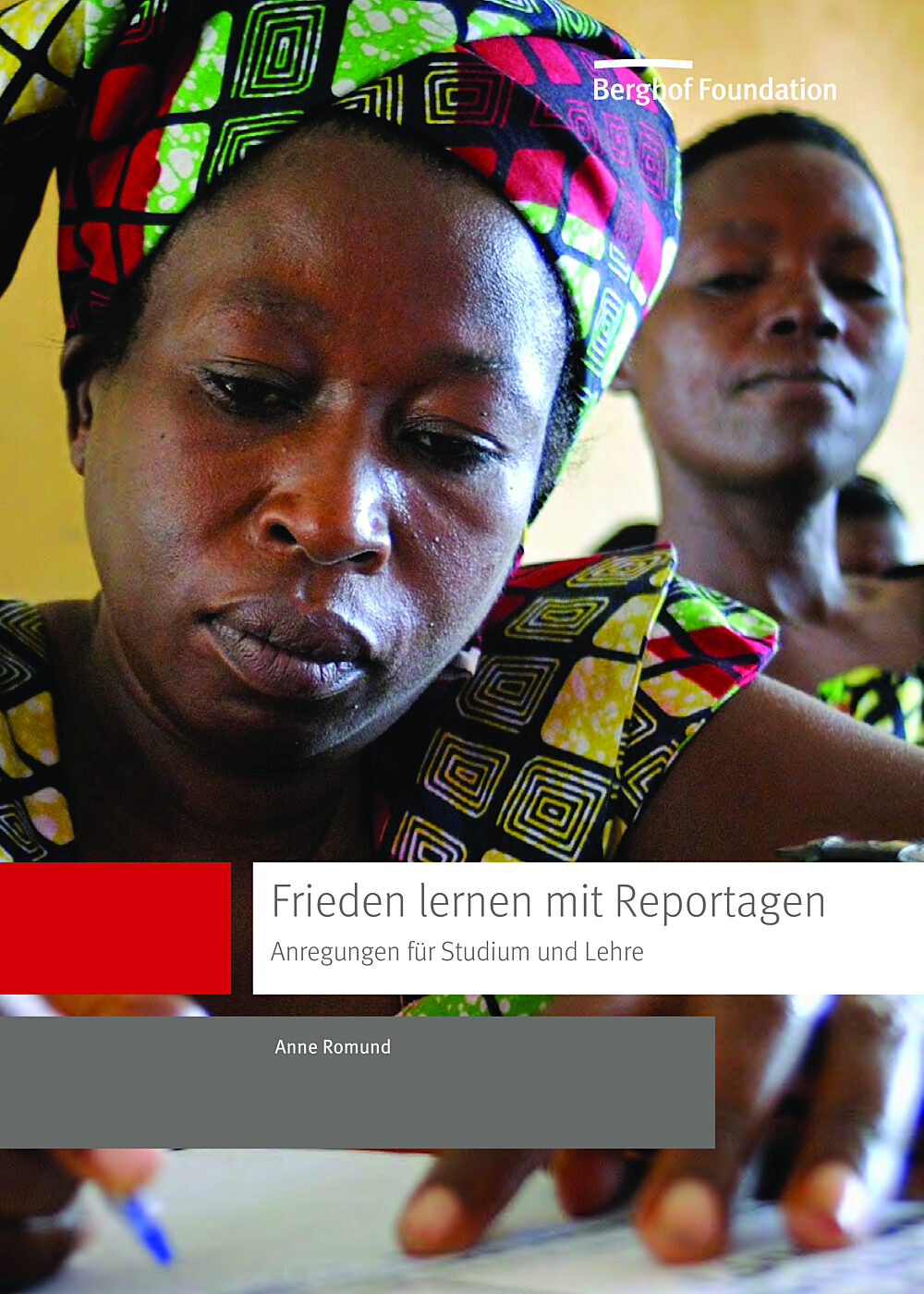
Frieden lernen mit Reportagen
"Frieden lernen mit Reportagen" verbindet journalistische Berichte über aktuelle Beispiele der Friedensstiftung aus verschiedenen Ländern mit friedenswissenschaftlichen Essays zu Themen wie Versöhnung, traditionelle Mediation oder Friedenspotenzialen von Jugendlichen. Jeder Themenblock wird durch didaktische Anregungen ergänzt und eignet sich damit besonders für den Einsatz in der Hochschullehre und der Erwachsenenbildung.
- Year2014
- Author(s)Anne Romund
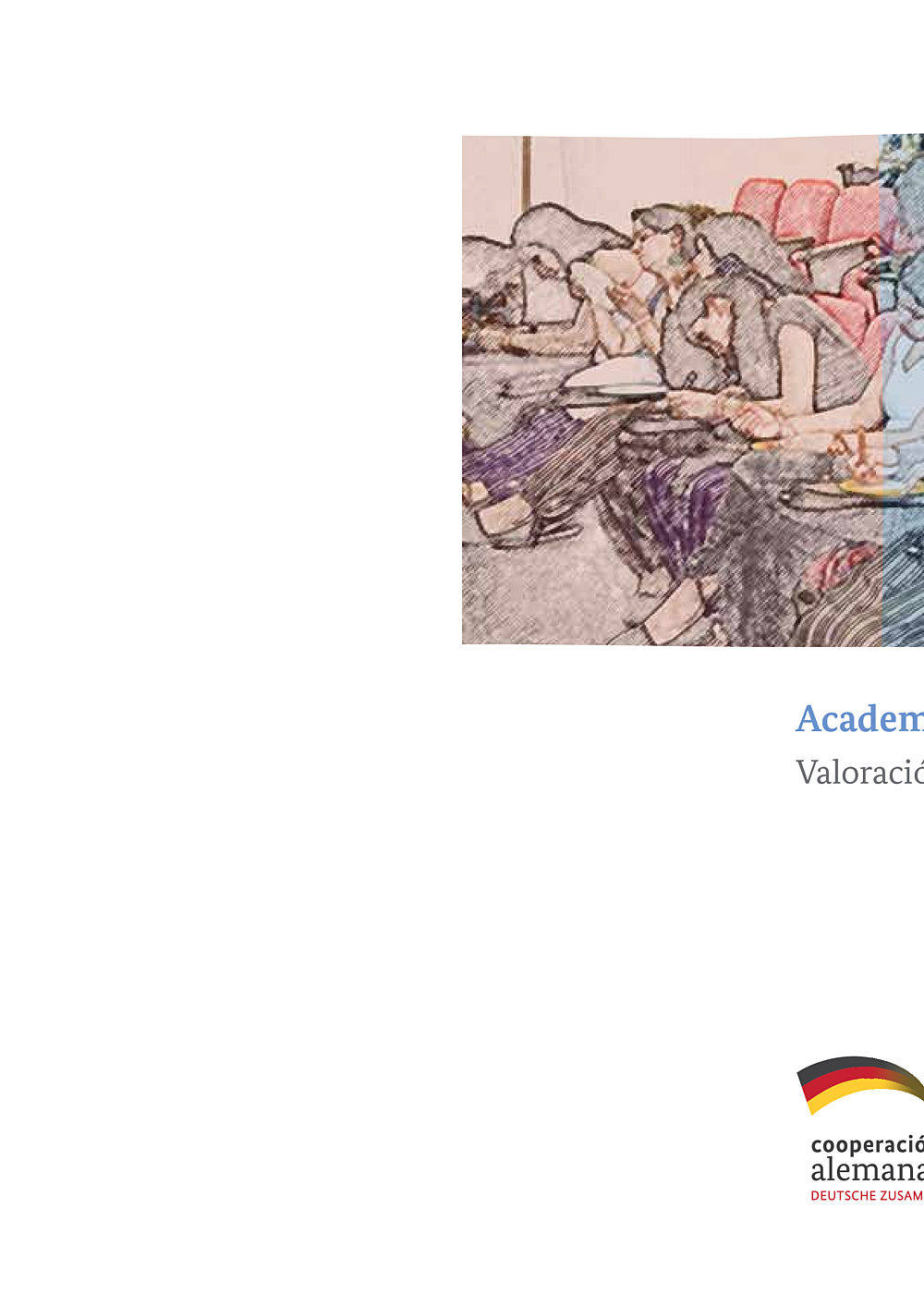
Academia y Construcción de Paz en ColombiaValoración de los aportes de la Cooperación Alemana
El documento brinda a los actores académicos, a la cooperación internacional en Colombia y a actores estatales y no estatales activos en la Construcción de Paz, un panorama de lo que se realizó y cuáles impactos se obtuvieron, igual que las lecciones aprendidas.
- Year2014
- Author(s)Carlos H. Fernández
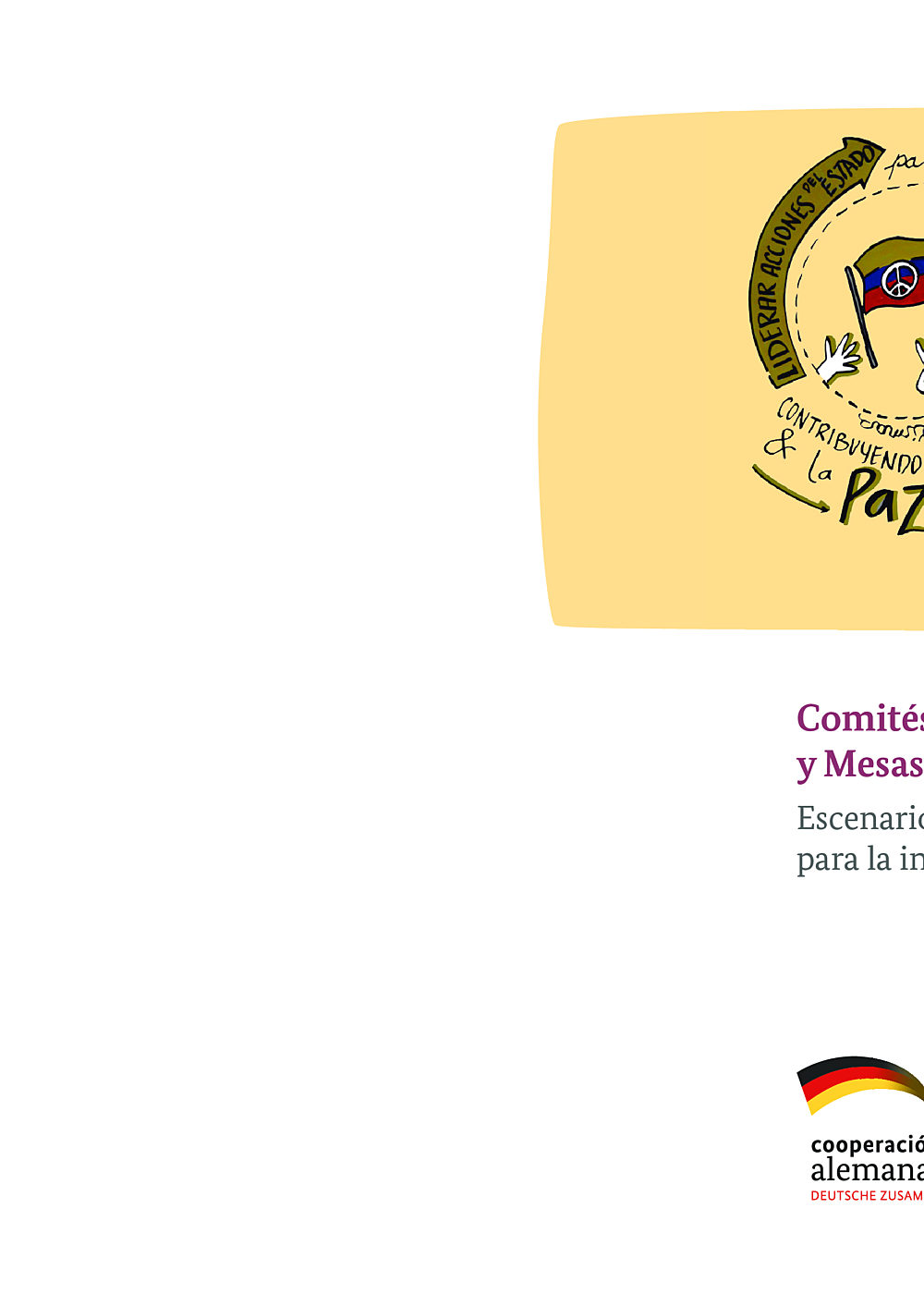
Comités Territoriales de Justicia Transicional y Mesas de Participación de VíctimasEscenarios que favorecen el diálogo entre Estado y Sociedad Civil para la inclusión social y la Construcción de Paz en Colombia
Cercapaz tiene como objetivo fomentar la cooperación entre el Estado y la Sociedad Civil para la inclusión social y la Construcción de Paz. Una de las líneas temáticas priorizadas para su tercera y última fase (2012-2015) es la inclusión social de grupos tradicionalmente excluidos, a través del fortalecimiento de los espacios de participación que plantea la Ley de Víctimas: los Comités Territoriales de Justicia Transicional (Comités, en adelante) y las Mesas de Participación de Víctimas (Mesas, en adelante). Este documento sistematiza los aprendizajes del proceso de asesoría a estos espacios y a los actores que los conforman, y entrega recomendaciones replicables en otras zonas del país. Adicionalmente, como parte del proceso de sistematización y como complemento a este documento, se realizó un video didáctico que ilustra de manera sencilla el funcionamiento de Comités y Mesas, sus interrelaciones, así como las capacidades básicas que deberían tener quienes participan de estos espacios para su buen desarrollo.
- Year2014
- Author(s)Lorena Cantillo, Hilka Langohr, Juanita Méndez
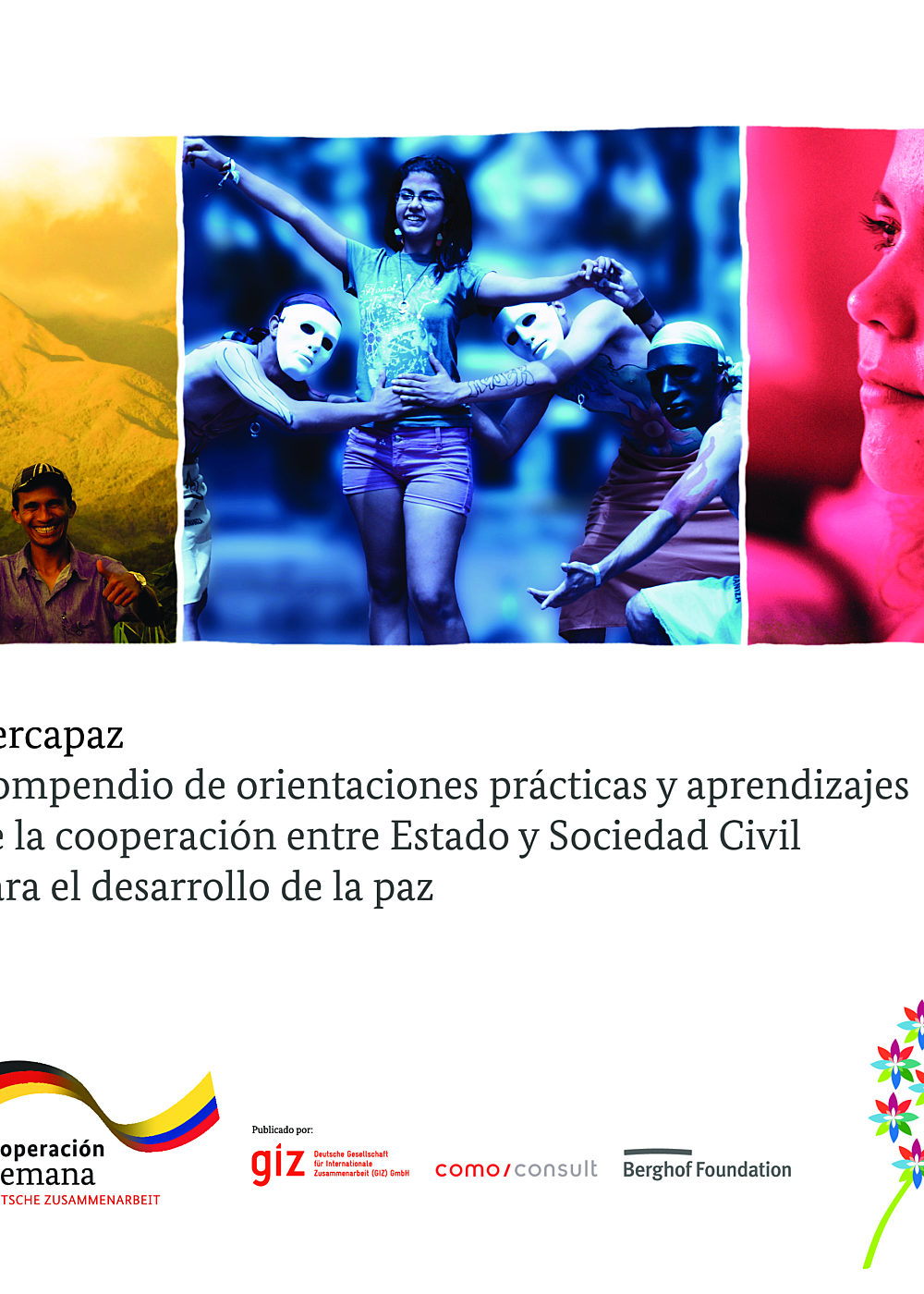
Compendio de orientaciones prácticas y aprendizajes de la cooperación entre Estado y Sociedad Civil para el desarrollo de la paz
¿Cómo lograr que actores con diferentes intereses lleguen a acuerdos? ¿Cómo iniciar diálogos para la construcción de visiones conjuntas? ¿Cómo hacer propicios los escenarios para que generen confianza entre los actores y estimulen el diálogo constructivo? Estas son algunas de las preguntas surgidas en los procesos que giran en el ámbito de la Construcción de Paz y la gobernabilidad.
Las experiencias que se encuentran en este Compendio muestran algunos posibles caminos y opciones para abordar estas preguntas. Surgen en el marco del trabajo realizado entre 2007 y 2014 por el programa Cercapaz, Cooperación entre Estado y Sociedad Civil para el Desarrollo de la Paz. Cercapaz es un programa que se ejecuta a través de la Agencia Alemana de Cooperación Internacional al Desarrollo (GIZ, por su sigla en alemán) por encargo del Ministerio Federal de Cooperación Económica y Desarrollo de Alemania (BMZ, por su sigla en alemán). Su tercera y última fase culmina en marzo de 2015.
- Year2014
- Author(s)Jaime Andrés Gómez, Hilka Langohr, María Claudia Linares